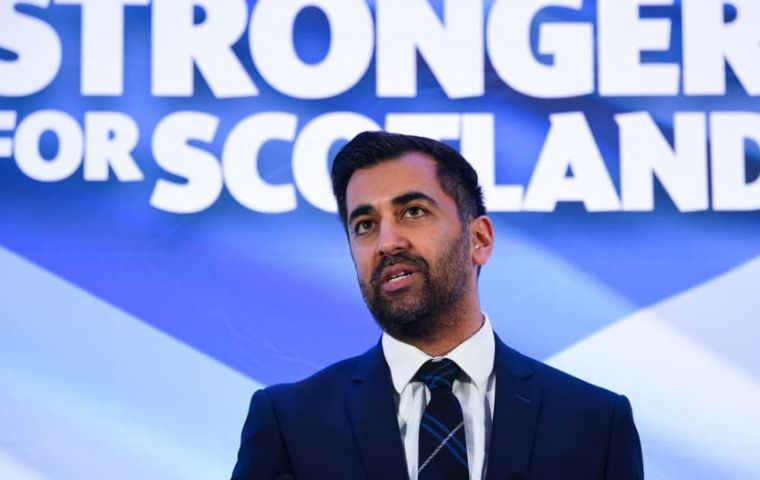MercoPress. South Atlantic News Agency
Yousaf, a Muslim of Pakistan origin, Scotland's leader and next First Minister
 Mr Yousaf had the support of far more SNP MPs and MSPs than his two leadership rivals
Mr Yousaf had the support of far more SNP MPs and MSPs than his two leadership rivals Humza Yousaf, identified as the “continuity candidate” has been elected to succeed Nicola Sturgeon as Scotland's National Party, SNP leader and Scotland's next first minister. He was widely seen as being the preferred candidate of the SNP establishment, including outgoing Ms Sturgeon herself.
The health secretary was endorsed by far more MSPs and MPs than his two rivals, with Deputy First Minister John Swinney predicting that Mr Yousaf would “complete our journey to independence”.
He is undoubtedly the most experienced of the three leadership contenders, having served in government since 2012 in roles including justice secretary and transport minister.
His supporters say he is a polished communicator who is best placed to unite the party and maintain the power-sharing agreement with the Scottish Greens.
Mr Yousaf is a close ally of Ms Sturgeon and is generally seen as the “continuity candidate” who would seek to continue the work of the outgoing first minister.
He is the only one of the three contenders to have said they would challenge the UK government's block on Ms Sturgeon's controversial gender recognition reforms in the courts, arguing that independence will only be won if the party continues to push “progressive values”.
But he has stressed that he would only go to court if the legal advice suggested that a challenge could be successful.
Mr Yousaf has distanced himself from Ms Sturgeon's plan to use the next election as a de facto referendum, saying that he would instead seek to build a “consistent majority” in favor of independence and it “isn't good enough to have polls that put support for independence at 50% or 51%”.
But he has attempted to reach out to more impatient independence supporters by saying he would consider calling a snap Holyrood election to test support for leaving the UK.
Mr Yousaf also rejected claims that the party hierarchy was doing everything it could to ensure he won the leadership contest following allegations that the shortened campaign was specifically designed to favor him.
And he has said he would be willing to listen to concerns over controversial policies such as proposals for a new national care service and the bottle return scheme.
When the 37-year-old is confirmed as Scotland's first minister, he will make history as the first ethnic minority leader of a devolved government and the first Muslim to lead a major UK party.
His father is originally from Pakistan and emigrated to Scotland with his family in the 1960s, while his mother was born into a South Asian family in Kenya, and Mr Yousaf has often spoken of the racist abuse he has received.
He was forced to call the police after allegedly receiving threats at the start of the leadership contest, with a 25-year-old man and 35-year-old woman being arrested and charged.
Mr Yousaf was educated at the Hutchesons' Grammar private school in Glasgow, where he was two years behind Scottish Labour leader Anas Sarwar.
After studying politics at Glasgow University, he briefly worked in a call centre before becoming a parliamentary assistant to SNP MSP Bashir Ahmad and later an aide to Alex Salmond.
Mr Yousaf was elected as a list MSP for the Glasgow region in 2011, with Mr Salmond promoting him to minister for Europe and international development just a year later.
He became transport minister in 2016 after winning Glasgow Pollok from Labour, which made him the first ethnic minority candidate to win a constituency seat in the Scottish Parliament.
Six months after taking on the transport portfolio, Mr Yousaf faced the embarrassment of being fined £300 and having six penalty points added to his licence after being stopped by the police while driving his friend's car without the proper insurance.
He also faced criticism for the performance of ScotRail after Abellio took over the contract to run the rail franchise, which ultimately led to it being nationalised.
Mr Yousaf was promoted again in 2018 when Ms Sturgeon named him as the new justice secretary as part of a reshuffle of her cabinet team.
But his flagship hate crime bill was mired in controversy over fears that the new offence of “stirring up hatred” could have a major impact on freedom of speech.
Critics said the legislation could lead to libraries and bookshops being prosecuted for having contentious books on their shelves, with the new law also potentially criminalising people for private conversations in their own home.
The bill was described by former SNP deputy leader Jim Sillars as being “one of the most pernicious and dangerous pieces of legislation ever produced by any government in modern times in any part of the United Kingdom”.
It was eventually passed by MSPs in March 2021 after a series of changes were made, but has still not become law.




Top Comments
Disclaimer & comment rulesCommenting for this story is now closed.
If you have a Facebook account, become a fan and comment on our Facebook Page!